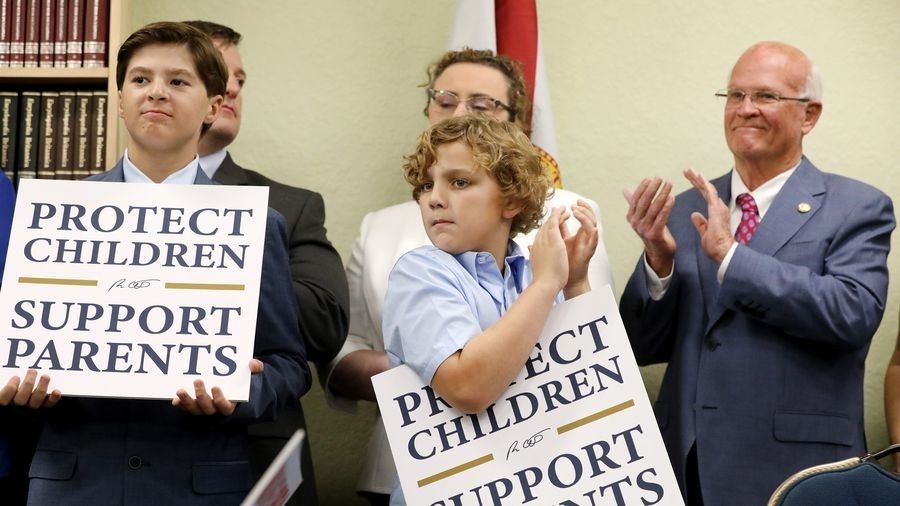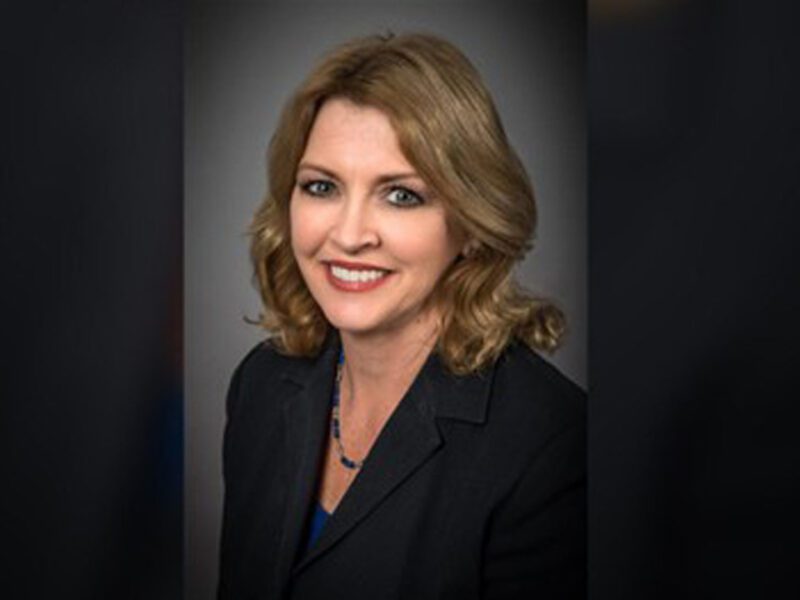
A breakdown of the language in Florida’s so-called ‘don’t say gay’ bill
Here’s key wording in Florida’s House Bill 1557, officially named the “Parental Rights in Education” bill.
Tampa Bay Times | By Mary Ellen Klass | March 29, 2022
TALLAHASSEE — When Gov. Ron DeSantis signed the “Parental Rights in Education” bill Monday, which opponents deride as the “don’t say gay” bill, he repeated what he has been saying since the controversial bill first emerged in Florida: “Leftist politicians, activists and corporate media” are getting the intent of the bill all wrong.
“Many of the people who helped whip this up have never actually read the bill,” DeSantis said. “They haven’t taken the time to do that. They would rather just further narratives.”
The text of the seven-page bill never mentions the word “gay.” Its vague provisions offer few details for how the ban on teacher-led instruction of gender and sexuality will be implemented in Florida’s public schools and yet both sides say they understand precisely what the intent is.
DeSantis said the goal of HB 1557 is “providing protections for parents and enforcing parents’ rights” over the education of their children to prevent a trend of “sexualizing children” that he claimed is running rampant in other states.
“Kindergarten students are taught about being transgender as part of, ‘social justice standards.’ In Denver, kindergartners were subjected to quote, ‘gender sensitivity training,’ and in Illinois, they require sex education, beginning in kindergarten,” DeSantis said.
Opponents warned it is a solution in search of a problem because the primary provisions of the bill — banning teacher-led discussion of sexual orientation and gender identity in kindergarten through third grade — is a subject currently not taught in public schools. They say the law is intentionally vague, intended to suppress talk of gender inclusiveness in schools, intimidate teachers into avoiding the topic and target LGBTQ students.
“The party of ‘less government’ is becoming the party of authoritarianism & censorship,” wrote Sen. Shevrin Jones, a Miami Gardens Democrat, on Twitter.
Here are key provisions of the new law, which takes effect July 1, a summary of what supporters say it does, and a summary of some of the concerns raised by opponents.
Student welfare
Lines 66-81 in the bill: School districts must “adopt procedures for notifying a student’s parent if there is a change in the student’s services or monitoring related to the student’s mental, emotional, or physical health or well-being and the school’s ability to provide a safe and supportive learning environment for the student. The procedures must reinforce the fundamental right of parents to make decisions regarding the upbringing and control of their children by requiring school district personnel to encourage a student to discuss issues relating to his or her well-being with his or her parent or to facilitate discussion of the issue with the parent. The procedures may not prohibit parents from accessing any of their student’s education and health records created, maintained, or used by the school district.”
Supporters say the provision codifies existing practice and recognizes what DeSantis said Monday: “that in the state of Florida, parents have a fundamental role in the education, health care and well-being of their children.”
Opponents warn the provision could have a chilling effect on confidential conversations between school counselors and young people about the struggles that they’re having with their sexual orientation and gender identity.
Parental notification
Lines 82-96: “A school district may not adopt procedures or student support forms that prohibit school district personnel from notifying a parent about his or her student’s mental, emotional, or physical health or well-being, or a change in related services or monitoring, or that encourage or have the effect of encouraging a student to withhold from a parent such information. School district personnel may not discourage or prohibit parental notification of and involvement in critical decisions affecting a student’s mental, emotional, or physical health or well-being. This subparagraph does not prohibit a school district from adopting procedures that permit school personnel to withhold such information from a parent if a reasonably prudent person would believe that disclosure would result in abuse, abandonment, or neglect.”
The details of this portion of the law are yet to be developed, and it is unclear exactly how they will work. But some LGBTQ advocates worry that the provision could lead to schools outing gay or transgender kids to their parents, potentially exacerbating mental health challenges students already face.
Sen. Manny Diaz, R-Hialeah, told the Senate during legislative debate on March 8 that a counselor would not be required to contact a parent if a student comes to them to say “they are confused and they feel like they may be gay.”
Instead, if the counselor determines the information will prompt a change in services for the student, or if they have a concern about the student’s safety because they might be suicidal, “the provision to notify the parents would kick in,” Diaz said, “unless they feel that the student at home would be in danger from the reaction of the parent.”
Opponents warn, however, that teachers may not know students’ lives well enough to know what kind of backlash or violence they’re going to face if they’re outed without their consent.
Classroom instruction
Lines 97-101: “Classroom instruction by school personnel or third parties on sexual orientation or gender identity may not occur in kindergarten through grade 3 or in a manner that is not age appropriate or developmentally appropriate for students in accordance with state standards.”
This is the most controversial section of the new law and, although it does not address instruction on sexual activity, it specifically prohibits instruction on sexual orientation and gender identity. The measure also does not define “age-appropriate” but makes sure that in the early grades, where sex education is not taught, teachers will also not teach about gender identity.
Department of Education commissioner Richard Corcoran said Monday that his agency will determine age-appropriateness by establishing standards, curriculum and professional development “so that people have that clear understanding.” He said that “teachers are supportive, but they want guardrails.” The law gives the agency until June 30, 2023, to write those guidelines.
DeSantis said he believes most teachers do not try to pursue “some type of ideological agenda,” but he said the push for gender inclusion instruction is often a “directive from on high” from “very politicized members of school boards.”
Sen. Danny Burgess, R-Zephyrhills, said the law “is intended to be applied uniformly across the state” as local school districts apply standards set by the Department of Education “and implement it within their local bodies.”
But this is the provision that gives opponents the most concern because they believe its vague wording will prompt teachers to self-censor and avoid using words like “gay” and other gender-inclusive terms in their classrooms, no matter the grade.
“We know that teachers are not teaching sex ed in K through three grades but a lot of teachers are attempting to discuss inclusive families, particularly when they have kids in their classroom who have same-sex parents or have transgender parents,” said Ryan Thorsen, a researcher at Human Rights Watch who has studied Florida’s legislation. “This would really hamstring their ability to do that, particularly in K-3, and potentially silence discussions in other grades, depending on how teachers interpret the bill.”
Student support services
Lines 102-105: “Student support services training developed or provided by a school district to school district personnel must adhere to student services guidelines, standards, and frameworks established by the Department of Education.”
This section leaves it up to the Department of Education to adopt training standards for teachers and other school personnel, in addition to the curriculum, that will shape how the measure is implemented.
School officials say that every school district is examining existing programs and risk-management teams are trying to decide how to avoid violating the law. The fear, they say, is that vague standards will open the door to lawsuits that will give districts a black eye and subject the district to attorneys fees, even if they are dismissed years later.
Meanwhile, LGBTQ supporters fear that the Department of Education rules could mirror those already in statute, which require students taking health class and who are learning about HIV/AIDS also be taught the “benefits of monogamous, heterosexual marriage.”
“Historically, the Department of Education has not created LGBT-inclusive school curricula,” said Thorsen, of Human Rights Watch.
Parents opt-out and questionnaire
Lines 106-109 and 114-118: “At the beginning of the school year, each school district shall notify parents of each healthcare service offered at their student’s school and the option to withhold consent or decline any specific service ….
“Before administering a student well-being questionnaire or health screening form to a student in kindergarten through grade 3, the school district must provide the questionnaire or health screening form to the parent and obtain the permission of the parent.”
These provisions require school districts to create an opt-out procedure for parents regarding mental and physical health care services for their students. Those services could include counseling and support groups, but the law also targets the practice of using questionnaires to screen for mental and social-emotional stress among students.
“This ensures that whenever a questionnaire or health screening is given to our young students, parents receive it first and give permission for the school to give it to their child,” DeSantis said.
Advocates warn that students who are most in need of the kind of support that might be revealed in a questionnaire might also be those whose parents are more inclined to shield them from services.
School officials also are concerned that they will need to get specific permission before treating a routine medical incident because of the opt-out clauses. There is also concern about some children whose parents do not respond to requests for parental consent.
Parents’ rights to legal recourse
Lines 119-128 and beyond: “Each school district shall adopt procedures for a parent to notify the principal, or his or her designee, regarding concerns under this paragraph at his or her student’s school and the process for resolving those concerns within 7 calendar days after notification by the parent. At a minimum, the procedures must require that within 30 days after notification by the parent that the concern remains unresolved, the school district must either resolve the concern or provide a statement of the reasons for not resolving the concern.”
Parents who are unhappy about what their child is being taught in school on those subjects will have three options to bring a complaint:
- They may bring the concern to the district for resolution.
- If the district does not resolve their concern, they can have the matter reviewed by the State Board of Education.
- They can hire a lawyer and file a lawsuit against the school district.
Before parents can sue a school district, 37 days must pass during which their concern is not addressed. They may also ask the district to appoint a special magistrate. Sen. Dennis Baxley, R-Ocala, called the process of hiring a special magistrate the “pathway for this to happen and much less cost than a lawsuit.”
Opponents warned that giving parents a cause of action incentivizes disgruntled parents to sue school districts, requiring taxpayers to pay for lengthy lawsuits and attorneys fees.
“What you will get are frivolous lawsuits,” said Sen. Tina Polsky, D-Boca Raton, during Senate debate. “In my county, there are lots of people, they’re talking about how evil and awful our school district is — the evil books, the evil conversations that are being had and these people will sue.”





